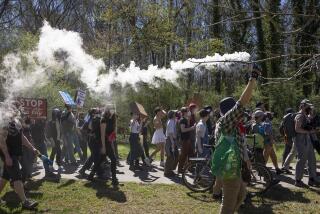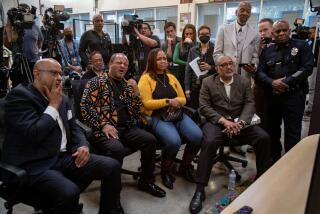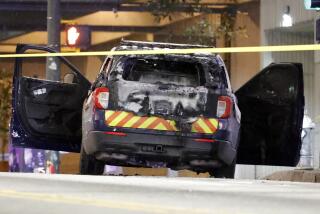Violence Erupts in Atlanta as Other Cities Brace for Trouble
NEW YORK — Hundreds of black youths went on a rampage through downtown Atlanta on Thursday, while in cities elsewhere officials and police braced for possible violence as the verdicts in the Rodney G. King beating case appeared to touch a raw nerve around the country.
In Madison, Wis., the windshields of 34 parked police cars were shattered and a note at the scene read, “Justice for King.” In New York City, black and white students at a Catholic school in Queens walked out of their classes chanting “Rodney, Rodney, Rodney.” In Providence, R. I., and Seattle, city officials and black community leaders appealed for calm in the face of mounting public anger.
Municipal authorities prepared for the worst in the face of what many described as already volatile racial conditions in their communities.
In Washington, D.C., all police officers’ leaves were canceled and units were put on alert in anticipation of trouble.
“Everybody’s on pins and needles in my ward right now,” said H. R. Crawford, a city councilman who represents a heavily black ward encompassing parts of northeast and southeast Washington. “Anything could set it off. We’re working double time to prevent any tragedies here.”
New York City’s police operations and community affairs network also were put on alert. “You can never be too prepared,” said Deputy Mayor Bill Lynch, recalling last summer’s outbreak of racial violence in the Crown Heights section of Brooklyn. “We want to be ahead of the curve instead of behind it.”
In Chicago, Police Supt. Matt Rodriguez said the department’s command operations and community assessment centers were evaluating all reports of “unusual incidents or conditions” in efforts to defuse any potentially volatile situations.
John Dineed, president of Chicago’s biggest police union, added: “There’s supposed to be a heat wave tomorrow. Hopefully, it won’t (spark violence), but the officers are alert to the fact that anything could . . . even a traffic ticket.”
In Seattle, where police efforts to contain gang violence in the inner-city Central District have led to friction between residents and police in recent weeks, Norm Rice, the black mayor of a city that is 90% non-black, called the King verdicts “shocking” and said that he and other civic leaders were taking steps to prevent a clash that could touch off violence.
“You don’t know what can set it off,” added the Rev. Samuel McKinney, pastor of Seattle’s Mt. Zion Baptist Church. “Unrest can catch on like a conflagration. I hope it doesn’t.”
Protests and rallies, almost all of them peaceful, were held in cities around the country to denounce the King verdicts.
In Atlanta, more than 400 people gathered at a nonviolent rally in front of the white marble crypt of slain civil rights leader Martin Luther King Jr. They carried signs reading “L.A. Has No Justice,” “Put Justice in the Justice System,” “King Verdict Was a Wakeup Call--Stop the Killing” and “Live as Brothers or Perish as Fools.”
“If Dr. King were here today, I’m almost certain that he would have been on the first thing smoking out of Atlanta on his way to L.A.,” said King’s daughter Bernice, an Atlanta attorney and minister. “God has created us, and if nothing else we owe it to God Almighty to do something about this tragic situation” in Los Angeles.
Not long after the peaceful rally at King’s tomb, however, hundreds of black youths poured into downtown from the direction of the predominantly black Atlanta University complex and went on a rampage.
Chanting “Rodney King, Rodney King,” one group of about 70 rioters attacked Macy’s department store on downtown Peachtree Street, smashing two big display windows and overturning racks of merchandise and displays of shoes and jewelry. The store was forced to close early and employees were sent home.
Another group marched on the state Capitol, hurling rocks and bottles at buildings and cars along the way. A woman was beaten and kicked on the steps of a state office building. State police in riot gear closed down the gold-domed Capitol.
Atlanta Mayor Maynard Jackson spent the afternoon trying to calm the rampaging protesters. He spoke through a bullhorn from the steps of City Hall, which is near the Capitol, and then moved into the crowds, trying to persuade them to break up and move on.
Afterward, Jackson traveled to the Atlanta University complex to urge calm. He later told a local television reporter that he saw in the students there a “real feeling of hopelessness” and “a level of frustration and anger” that he had not seen in a long time.
About 300 people were arrested and at least 17 were admitted to a downtown municipal hospital with injuries from the rioting, authorities in Atlanta said.
In contrast to Atlanta, Miami remained calm well into the evening. “No incidents, not a single one,” said Miami police spokesman Angelo Bitsis.
Bitsis added, however, that Miami police--who have perhaps more riot experience in the last 11 years than any other urban police force in the nation--are not taking any chances. “We do have some people standing by,” he said. “We’re monitoring the situation, and we’ll be able to respond quickly.”
A peaceful protest against the King verdict on the steps of Cleveland’s City Hall nearly erupted into violence when a 31-year-old white man drove by in a van with both a Nazi flag and a Confederate battle flag flying from it.
Demonstrators chased after the vehicle but failed to catch it. However, an off-duty policeman followed the van to the man’s home and arrested him.
Civil rights leaders across the country have been vigorous in their denunciation of the King verdicts.
“We are here to express our outrage, our indignation at the appalling decision rendered yesterday in California,” Joseph P. Fowlkes Jr., president of the Providence, R. I. NAACP chapter, told reporters at a news conference.
He said that he had not been so distraught since the slaying of King. “I can understand how and why people can be up in arms,” he said, but added that “we call for calm not only in Los Angeles but anywhere in the country.”
Tom Jenkins, president of the Denver Urban League chapter, said of the jury decision in the King case: “It is a good indication . . . that justice is not blind. Justice is peeping out from underneath that blindfold to see who justice is being applied to, and it is being applied differently to poor people and people of color than it is to others.”
While he anticipated no immediate violent reaction among blacks in Denver to the King verdicts, he said that they will fester in their minds. “And on one of these hot summer nights, when a cop pulls up and says the wrong thing to the wrong African-American young male who happens to have an Uzi right beside him in the car, it’s goodby Denver policeman,” he said. “There is no question, the seeds are there.”
Gary Peter Klahr, a Phoenix attorney who was the first private citizen to sit on the Phoenix Police Department’s advisory committee on the use of force, was among many civic leaders throughout the nation who called on the U.S. Justice Department to seek an immediate federal indictment of the four Los Angeles police officers involved in the King trial.
“The grand jury should start meeting tomorrow,” he said, adding that he did not expect the violence in Los Angeles and Atlanta to spread elsewhere, “but it might if Bush doesn’t show some leadership.”
The depth of resentment at the King verdicts among ordinary black citizens was reflected in the comments of a black Washington communications specialist who asked to remain unidentified. “When I heard the verdict on the news, all I could think of was that this was going to be ‘Hate Whitey Day’ for me, and no white person had better tick me off,” she said.
In Memphis, Tenn., Brodie Clayton, 40, asked rhetorically: “What do I tell my kid now? How can I tell my kid to respect the law and he sees something like this? When I saw that video, I said the world is getting ready to wake up. This stuff has been happening for as long as I can remember.”
But, he added, referring to the verdict: “This has just brought it out that ain’t nothing going to change.”
Norman Siegel, executive director of the New York Civil Liberties Union, said the decision in the King case was certain to compound the difficulties groups like his have in getting blacks in inner-city neighborhoods to work within the system in dealing with police brutality cases.
“They’re going to say, ‘Hey, gimme a break, we remember Rodney King,’ ” he said. “Rodney King becomes a symbol--in fact a martyr--for the proposition that you can’t get justice in a case against the cops. I think it will wind up as an outrageous chapter in American history.”
Matt Foreman, executive director of the New York City Gay and Lesbian Anti-Violence Project, contended that, in addition to reinforcing the “complete cynicism” that minorities have in the justice system, the rioting by blacks in places such as Los Angeles and Atlanta would bolster the notion among many majority Americans that “some people deserve to be beaten.”
“The whole thing is extremely painful,” Foreman said. “It’s going to embolden those police officers who choose to act out their hostilities in a violent way. It gives them a clear signal that this kind of behavior is tolerated.”
But Doug Elder, president of the Houston Police Officer’s Assn., spoke for many law enforcement officers when he said that he supported the verdict because he supports the judicial system.
“I have spent my entire law enforcement career supporting this system,” he said. “There is more than one side to a story. Obviously, the people that were on that jury had more information than those of us who just saw small parts of the tape on television.
“How do community leaders say the verdict is a complete travesty of justice and a mockery of the system on one hand, and then tell people to be calm on the other?” he asked rhetorically.
Lt. Charles Peckat, a white officer with the North Little Rock, Ark., Police Department, said: “We’re trained to look at the whole picture, not just part of it. There are at least 12 people who got to see the whole picture.”
Contributing to this story were Times staff writers John Balzar in Seattle, John J. Goldman in New York, Ron Harris in Los Angeles, Richard E. Meyer in Little Rock, Ark., and Marilyn Yaquinto in Washington, D.C.; researchers Doug Conner in Seattle, Lianne Hart in Houston, Ann Rovin in Denver, Edith Stanley in Atlanta, Tracy Shryer in Chicago and Anna Virtue in Miami, and special correspondents Mike Clary in Miami and Laura Laughlin in Phoenix.
More to Read
Sign up for Essential California
The most important California stories and recommendations in your inbox every morning.
You may occasionally receive promotional content from the Los Angeles Times.










